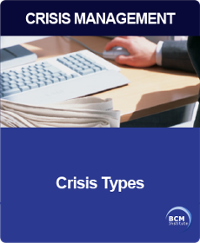 Here is another type of crisis scenario described in the "What Crisis or Crisis Scenario Should I Be Planning For My Organisation?" that is on the list to handle as part of crisis management and crisis communication. Click the right icon to read more.
Here is another type of crisis scenario described in the "What Crisis or Crisis Scenario Should I Be Planning For My Organisation?" that is on the list to handle as part of crisis management and crisis communication. Click the right icon to read more.
Natural threats are environmental and natural disturbances leading to a natural crisis. They are usually beyond the scope of human control.
Natural Threats
 Natural threats are often geographical; their likelihood and commonality depend primarily on the country where your organization's operations are located.
Natural threats are often geographical; their likelihood and commonality depend primarily on the country where your organization's operations are located.
Indonesia and Japan are at risk of earthquakes, Singapore has a good chance of getting haze from the Indonesian forest fires every year, Australia and California have wildfires, and China and Philippine organizations have to prepare for hurricanes, to name a few brief examples.
Thus, all unlikely threats must be omitted during risk assessment, and only those stapled to the organization's country(s) of operations should be considered.
Some of the common threats listed under Natural Threats include but are not limited to:
|
|
|
Threat Awareness
There are two basic types of Natural threats: Those with pre-awareness, where organizations know they're coming, and those where they do not. With natural threats like Hurricanes, Blizzards, and Tropical Storms, organizations usually have some degree of pre-warning to prepare for the impending disaster.
Other natural threats, like Haze, come slowly and have a comparatively negligible impact compared to other natural disasters. On the other hand, you have natural disasters that have limited to no pre-awareness: earthquakes, Wildfires, and Dust storms that can catch organizations unawares.
Thus, organizations must prepare and update their business continuity and crisis management plans before natural threats occur.
More Information About Crisis Management Blended/Hybrid Learning Course
To learn more about the course and schedule, click the buttons below for the CM-300 Crisis Management Implementer [CM-3] and the CM-5000 Crisis Management Expert Implementer [CM-5].







![[BL-CM] [5] Register](https://no-cache.hubspot.com/cta/default/3893111/82024308-16f4-4491-98be-818a882c6286.png)

![Email to Sales Team [BCM Institute]](https://no-cache.hubspot.com/cta/default/3893111/3c53daeb-2836-4843-b0e0-645baee2ab9e.png)




![Banner [BL-5-Catalog] What Expert Level Blended Learning Courses that are Available?](https://no-cache.hubspot.com/cta/default/3893111/f39d2d89-53b2-4f11-982f-dd3462f224ac.png)
![[BL-3-Catalog] What Specialist Level Blended Learning Courses that are Available?](https://no-cache.hubspot.com/cta/default/3893111/1073197e-c1bd-47d3-97dc-32e7533619b7.png)

